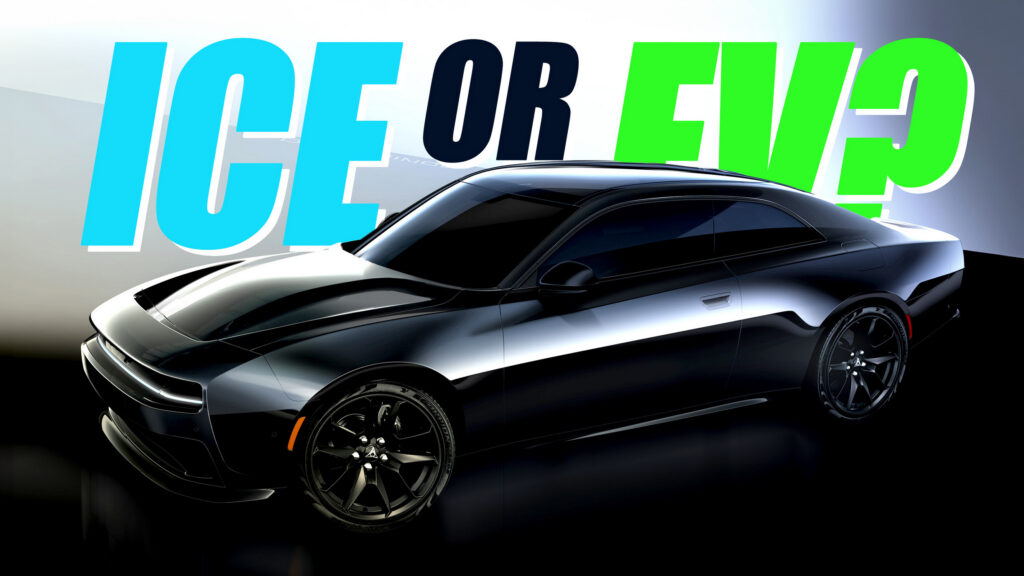
- Dodge will first launch the new Charger with two EV options this fall, with the gas-powered models to follow next year.
- A Tesla-rivaling 800-volt Charger EV will be added in the near future.
- The flagship ICE model packs 550 hp from its 3.0-liter Hurricane six-cylinder.
The new Dodge Charger has stirred a lot of debate since its unveiling in early March. Breaking with tradition, the new Charger will be available as both a sedan and a coupe concurrently. And that’s just the tip of the iceberg, as for the first time, it will offer buyers the choice of an electric or gasoline powertrain.
var adpushup = window.adpushup = window.adpushup || {que:[]};
adpushup.que.push(function() {
if (adpushup.config.platform !== “DESKTOP”){
adpushup.triggerAd(“4d84e4c9-9937-4f84-82c0-c94544ee6f2a”);
}
else{
adpushup.triggerAd(“6a782b01-facb-45f3-a88f-ddf1b1f97657”);
} });
The all-electric variant, sporting the exclusive Daytona name, arrives in dealerships first this summer. The gasoline model follows next year, ditching the traditional V8 in favor of a twin-turbocharged six-cylinder. So, which would you choose?
Read: Everything We Know About The New 2024 Dodge Charger
Underpinning the new Charger is the Stellantis STLA Large platform and two electric versions will initially be on offer. These are known as the R/T and Scat Pack and both feature 400-volt electric architectures.
window._taboola = window._taboola || [];
_taboola.push({
mode: ‘thumbnails-a-mid’,
container: ‘taboola-mid-article’,
placement: ‘Mid Article’,
target_type: ‘mix’
});
window._taboola = window._taboola || [];
_taboola.push({
mode: ‘thumbnails-oc-2×1’,
container: ‘taboola-mid-article-thumbnails-organic’,
placement: ‘Mid Article Thumbnails Organic’,
target_type: ‘mix’
});
Sitting at the base of the Charger Daytona range is the R/T with its 496 hp and 404 lb-ft (548 Nm) of torque. It is able to hit 60 mph (96 km/h) in 4.7 seconds and run down the quarter mile in 13.1 seconds.
Power-hungry buyers will also be offered the electric Charger in Scat Pack guise with 670 hp and 625 lb-ft (850 Nm). This model can hit 60 mph (96 km/h) in 3.3 seconds and run down the quarter-mile in 11.5 seconds. The R/T can travel 317 miles (510 km) on a charge while the Scat Pack’s range is capped at 260 miles (418 km).
As the new Charger family matures, at least four other 400-volt electric versions will be offered with different power outputs. An 800-volt model with a two-speed transmission is also in the works as the electric flagship.
Dodge hasn’t abandoned internal combustion entirely. The base gas-powered Charger utilizes a 3.0-liter twin-turbocharged six-cylinder engine, dubbed the Hurricane, which cranks out 420 horsepower. This is a healthy upgrade from the 375 horsepower offered by the outgoing 5.7-liter V8.
More: Dodge Charger Daytona Dealer Order Guide Reveals Colors, Packages, And Options
Performance enthusiasts will appreciate the range-topping option – another 3.0-liter Hurricane tuned to deliver 550 horsepower, surpassing the old 6.4-liter Hemi V8 by 65 horsepower. Knowing Dodge’s history of engine variations, we might end up seeing even hotter versions of this mill scorching the pavement if the gas-powered Charger proves to be popular, even if officials has dismissed such notions for the time being.
Dodge has yet to disclose pricing details for both the electric and ICE models. But assuming they’re comparable, or at least in the same ballpark, where would you put your hard earned money on, the EV or gas-powered Charger?
var adpushup = window.adpushup = window.adpushup || {que:[]};
adpushup.que.push(function() {
if (adpushup.config.platform !== “DESKTOP”){
adpushup.triggerAd(“5646c171-cb6e-4e2c-8440-49013ca72758”);
}
else{
adpushup.triggerAd(“e7c4c913-3924-4b2d-9279-6c00984dd130”);
} });
